|
|
1889 matching reports found. Showing 121 - 140 [TamilNet, Thursday, 19 December 2013, 07:53 GMT]Almost all the buildings that were situated in the 6,400 acres of lands seized by the occupying Sri Lankan military in Valikaamam North in Jaffna have been completely bulldozed by the SL military, according to those who have witnessed the destruction in recent days. The entire area of fertile cultivation and residential lands now looks like single piece of desert land, they said. Except the buildings used by the genocidal military at the ‘forward line’ and the building at the rear, close to the Palaali military base, everything else has been razed to the ground. The SL military is transforming the former High Security Zone into a Sinhala Military Zone to encapsulate the Palaali military complex in Jaffna with a Sinhala military colony of the occupying soldiers from South.
Full story >> [TamilNet, Tuesday, 03 September 2013, 05:48 GMT] The village of pigeons
The garden or orchard of pigeons
Full story >> [TamilNet, Wednesday, 21 August 2013, 23:43 GMT]Sri Lankan military intelligence in Jaffna on Wednesday staged a ‘protest’ against Ms Ananthi Sasitharan, the representative of thousands of Eezham Tamil women, who are demanding the Sri Lankan State to reveal the whereabouts of their husbands who were filtered away from the civilians in the final hours of the Vanni war by the SL military that had announced ‘general amnesty’ through the loudspeakers. Sinhala workers, intelligence operatives and some ex-LTTE members brought from elsewhere, were holding placards written in broken Tamil against Ananthi Sasitharan in front of the Jaffna Bus Stand. In the meantime, informed sources in Colombo said that the SL State was seeking to ‘influence’ certain foreign missions in Colombo to avoid UN Human Commissioner for Human Rights Navanetham Pillay meeting Ananthi, who is also contesting in the Provincial Council election on behalf of the TNA. Full story >> [TamilNet, Monday, 19 August 2013, 21:09 GMT]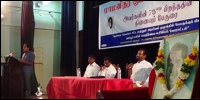 Do we have an environment to talk about Tamil nation and its right to self-determination? Do we have to ask for internal self-determination? Should we go step-by-step in achieving the goals? Do we have the right to call for a referendum? Could we insist on a transitional administration? Are they all realistic in our situation: asking these questions at the Kumar Ponnambalam Memorial Lecture to a fully packed audience in Jaffna on Sunday, Jaffna University Law Lecturer Kumaravadivel Guruparan said that we cannot wage a struggle by seeing what is in the international law, as international law is purposefully ambiguous leaving space for further discourses, and as what needed more than the international law are the mass mobilisation and the backing of powerful friends. Full story >> [TamilNet, Tuesday, 30 July 2013, 05:41 GMT]Like getting journalists, politicians, diplomats and academics in India from time to time over the decades, to engineer public opinion justifying the genocidal unity and integrity of the Sinhala-Buddhist State in the island, Colombo is now actively engaged in grooming ‘historiographers’ in India specialised in the Sinhala-Buddhist ‘State’ history, to which New Delhi’s Jawaharlal Nehru University (JNU) has become the partner and space provider, said an academic in Jaffna. He was citing the JNU in collaboration with the genocidal State’s High Commission in New Delhi starting a course in the university last year on “State, Society and religion in Sri Lanka, from circa 3rd century BCE to 13th century CE” with specific focus on Anuradhapura and Polonnaruwa period. Full story >> [TamilNet, Sunday, 14 July 2013, 11:02 GMT]The abuse of Eezham Tamil women committed by the Sri Lankan state apparatus should not be seen as individual human rights violations but as a part and parcel of an intended genocide of a protracted nature, write Dr. N. Malathy, key member of NESoHR and author of ‘A Fleeting Moment in my Country’ and RM Karthick, research scholar at University of Essex, UK. In an article published on Indian journal Sanhati’s 6th issue for 2013, the authors, criticizing international organizations for their failure to properly deal with the issue of genocidal rape by Sri Lankan forces, also call on the Tamil community to have a change of social approach towards rape survivors, noting how violence against Tamil women is deeply intertwined with communal identity. Full story >> [TamilNet, Saturday, 15 June 2013, 22:47 GMT]Even after four years have passed, More than 30 Saiva temples are found either destroyed or damaged in the three divisions of Ki'linochchi district, informed sources in Ki'linohchi told TamilNet on Saturday. In one division alone, 24 churches have been damaged during the war, according to civil sources in Ki'linochchi. In one of the division, Poonakari, two churches (St. Mary's Church and Our Lady of Refuge Church) were fully destroyed while 22 other churches have been partially damaged in Poonakri (Pooneryn). Full story >> [TamilNet, Tuesday, 28 May 2013, 23:51 GMT]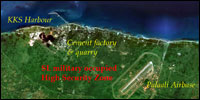 While the uprooted Eezham Tamils of Valikaamam North confront the occupying Sri Lankan State against the seizure of their lands in the former ‘High Security Zone’ (HSZ), the Sri Lankan military is moving fast with its secret plans of establishing permanent Sinhala military settlements to bring in families of the Sinhala soldiers into the former HSZ in Jaffna. Informed paramilitary sources in Jaffna told TamilNet Tuesday that a Sri Lankan commander has been assigned the task of converting the former HSZ into a Sinhala Military Zone (SMZ), consisting of Palaali military base. Already, more than 5,000 houses have been constructed in Mu'rika'ndi in Vanni and families of Sinhala soldiers are being provided housing there. There are at least 30,000 Sinhala soldiers stationed in the Jaffna peninsula. Full story >> [TamilNet, Saturday, 27 April 2013, 23:44 GMT] It is noted that D S Senanayake advised the British to grant independence to Ceylon early, citing that the Tamils will be problematic as they were followers of Gandhian principles led by the Jaffna Youth League that agitated for full independence, writes Mr. A Theva Rajan in New Zealand, commenting further on a TamilNet feature last Saturday that refuted a repeatedly told myth about British colonialism favouring Tamils. The feature, “Tehelka report misled on British treatment of Tamils,” challenged a recent statement by Ms Chandrika Bandaranaike Kumaratunga that the frustration of Tamils was due to lost privileges they had enjoyed under British favouritism aimed at ‘divide and rule’. The myth, constructed by Sinhala polity to justify State-conducted genocide in the island has misled a recent report by Tehelka too.
Full story >> [TamilNet, Saturday, 20 April 2013, 08:03 GMT]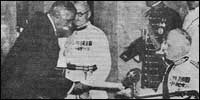 The Tehelka feature on Friday by Revati Laul is highly appreciable on many counts, as it has brought out the multifaceted genocide committed on Eezham Tamils so that they would remain “people without a nation, much like the Palestinians in the Gaza Strip,” the military-occupied situation that is worse than that of Afghanistan and the double game of the world cum UN expecting that the “idea of nationhood could be the next to disappear,” but yet the reality and determination of the people alive with the idea of a separate Tamil nation despite the terror and genocide. However, the feature is misled by a repeatedly told myth by the adversaries of Tamils and believed by the gullible even among the Tamils especially in the diaspora, that British colonialism once favoured the Tamils, writes an academic in Jaffna.
Full story >> [TamilNet, Friday, 05 April 2013, 23:49 GMT] Casteist terms used in derogatory ways by Sinhalese in their references towards Tamils reveal the sociological nature of the genocidal mind-set of Sinhalese in the island of Sri Lanka. "How many people outside of Sri Lanka know that 'Sakkiliya' is a Sinhala term used to refer to a Tamil person [...],” asks Christopher Tuckwood, who has introduced a new Internet-based tool, named Hatebase, to study hate language in predicting and preventing genocide. Tuckwood is the Executive Director and Co-founder of The Sentinel Project for Genocide Prevention, a Canada-based non-profit organisation dedicated to detecting and averting genocide throughout the globe. Full story >> [TamilNet, Monday, 01 April 2013, 21:57 GMT] Veteran Professor of Sinhala, Dr Sucharitha Gamlath passed away at the age of 79 in Colombo on Saturday and the funeral took place on Monday. Prof Gamlath was righteously anti-Establishment throughout his career and for nearly 15 years, the governments in Colombo kept him unemployed, which he faced heroically without compromising on his principles and convictions. To the end he steadfastly stood for the Tamil right to self-determination in the island of Sri Lanka. He was the first Professor of Sinhala at the University of Jaffna, appointed in 1975 (then the Jaffna Campus of the University of Sri Lanka) and his penalisation by the JR Jayawardane government took place in 1980 while he was serving at the University of Jaffna. TamilNet pays tribute to the scholar of a rare genre and expresses condolences to bereaving family members, friends and comrades. Full story >> [TamilNet, Tuesday, 26 March 2013, 12:28 GMT]Wild elephants in large numbers are systematically driven into villages where Tamils predominantly live in the Ampaa'rai district by a section of Sinhalese connected to the Sri Lankan Forest Department, presumably to prevent the uprooted Eezham Tamils from returning and resettling in their places of origin, sources in Ampaa'rai said. The Colombo government that exploits the poverty status of these people, while not providing them with the basic amenities, sponsors Sinhala colonisation schemes that also include settlement of SL military men in the area. So far, after 2009, seven new Sri Lanka Army camps have been established in Ampaa'rai district. Full story >> [TamilNet, Wednesday, 23 January 2013, 06:36 GMT]The Eighth meeting of the Indo-Sri Lanka Joint Commission held in New Delhi on Tuesday and was co-chaired by the External Affairs Ministers of the two Establishments, ended with nothing new either to the pressing issues of the genocide-facing island or to its bilateral issues with India, political analysts in the island commented. A Foreign Secretary level meeting on Monday preceded the ministerial meeting. Perhaps the only new programme found mentioned in the joint commission press statement was that both sides agreed to jointly celebrate the 150th birth anniversaries of Swami Vivekananda in 2013-14, and of Anagarika Dharmapala in 2014-15. Full story >> [TamilNet, Sunday, 30 December 2012, 12:35 GMT]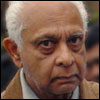 Dr Brian Seneviratne, 81-year-old Australian human rights activist of Sinhala origin steadfastly fighting for the rights of Tamils in the island of Sri Lanka, was deported by Singapore immigration on 14 December, when he came from Australia to go to Malaysia and address closed-door meetings on the push factors of refugees coming from the island via Malaysia and their handling by Australia. In a letter addressed to Australian Prime Minister, Ms Julia Gillard, raising several questions on the modus operandi of his deportation by Singapore defying a State’s obligation to the international rights of any person, Brian identifies the Government of Sri Lanka and the Government of Australia as the ultimate beneficiaries of his deportation. Full story >> [TamilNet, Thursday, 20 December 2012, 23:44 GMT]In the fourteen divisional secretariat divisions in the Batticaloa district more than one hundred and fifty thousand people had been rendered homeless following heavy rain with winds at high speed for the last few days. They have sought asylum in public buildings but the Colombo government has been showing indifferent attitude in providing immediate relief through its regional and divisional officials, complain affected people. In Trincomalee district four temporary welfare centers at Ki'liveddi, Paddith-thidal, Ma'nat-cheanai and Kaddaip-pa'richchaan where more than two thousand uprooted people from Champoor are residing are submerged in flood water due to the heavy rain for a week. Full story >> [TamilNet, Tuesday, 04 December 2012, 00:13 GMT]The Republic of Maldives announced on Monday that it would take back the operations of the international airport at Male from the Indian corporate GMR Group with effect from Saturday, cancelling its agreement for a US $ 511 million project. According to media reports, New Delhi threatens that it would consider freezing aid to Maldives, especially a US $ 25 million loan immediately needed by the Maldives for the payment of salaries to its civil servants. But the general public and businessmen in the Maldives feel that it is a big victory for their efforts in freeing their airport from the clutches of the Indian corporate. The agreement with GMR Group was signed in the times of the earlier president, Mohamed Nasheed. Full story >> [TamilNet, Thursday, 11 October 2012, 18:26 GMT]After the International Community of Establishments working in tandem with a genocide-intending Sri Lankan state oversaw a brutal military solution over the armed struggle of the Eezham Tamils in May 2009, the ‘Sri Lanka model’ of dealing with insurgencies is now being incorporated into the science of Counterinsurgency (COIN), opines RM Karthick, observing what dangerous ramifications this could have for struggling peoples worldwide in an article published on Sanhati, an Indian online journal, on Wednesday. Outlining internal and external factors in shaping the conflict, using the politico-military analysis of the late TamilNet senior editor ‘Taraki’ Sivaram, the author explains how internationally coordinated measures against the LTTE and the genocidal intent of Sinhala nationalists led to Mu’l’livaaykkaal and the systemic repression of the Eezham Tamils in their homeland that followed. Full story >> [TamilNet, Friday, 07 September 2012, 05:16 GMT]By inviting Mahinda Rajapaksa to inaugurate a Buddhist institution at Sanchi in Madhya Pradesh in India, both New Delhi’s Congress regime and the BJP-run Madhya Pradesh state government endorse religious sanction to the kind of genocide committed and being committed by the Rajapaksa regime of Colombo. In the process they undermine the prospects of Buddhism re-emerging as an expression of the downtrodden masses, accused Dalit Buddhist circles in Tamil Nadu. Sinhala Buddhism is an Orientalist rediscovery in the libraries of the colonial West. India’s Hinduism is no exception. Both have agreed upon the deployment of genocide in the annihilation of nations in the region and it is tested on Eezham Tamils. It is a warning to peoples all over South Asia and elsewhere, commented an academic in Jaffna. Full story >> [TamilNet, Tuesday, 04 September 2012, 18:00 GMT]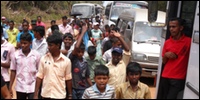 12.5 million Sinhala Buddhist visitors from the South have toured Jaffna peninsula during the last three years, from July 2009 to August 2012, according to the statistics released by the statistics division of the occupying Sri Lankan military in Jaffna. Highest number of visits was recorded in August 2012, when more than 100,000 southerners visited the peninsula. At least 80,000 of these visitors have been to Nagadipa vihara at Nayinaatheevu, an islet off Jaffna during the last month. In the meantime, the Eezham Tamil people of the peninsula, numbering less than 600,000 and the resettling people of Vanni live in a parallel universe without communication with the visiting Sinhalese, who are looked after by the occupying SL military and ‘civil’ administration. Full story >>
|
|














